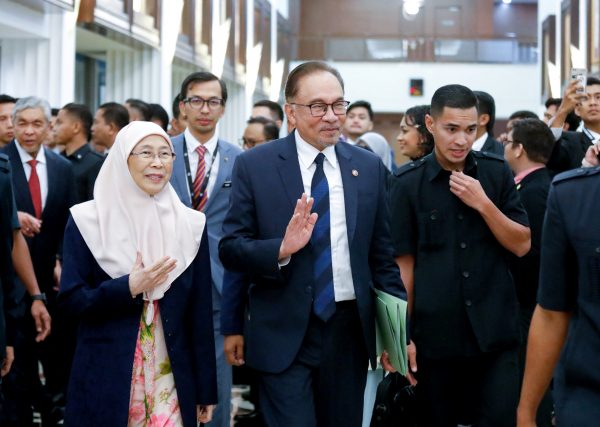While the dust has barely settled from the GE15, pundits are framing the upcoming elections as a referendum on Prime Minister Anwar Ibrahim’s leadership. Anwar’s Pakatan Harapan (PH) coalition has largely suggested that real reform can come once these pesky polls have passed.
But Anwar is on the defensive due to his sprawling coalition, his controversial decision to partner with Barisan Nasional (BN) — helmed by Malaysia’s once-dominant United Malays National Organisation (UMNO) — and PH’s questionable support among Malay voters.
The opposition coalition Perikatan Nasional (PN) is in a better position. The pact formed by the Parti Islam Se-Malaysia (PAS), UMNO-offshoot Parti Pribumi Bersatu Malaysia (Bersatu) and the waning multi-racial Parti Gerakan Rakyat Malaysia has maintained much of its electoral vigour.
PN claims the moral high ground against the excesses of UMNO under the former prime minister Najib Razak and its current leader Ahmad Zahid Hamidi. There is emerging evidence that the Malay-led and focused PN coalition is popular among younger Malay voters.
But this may have less to do with PN’s ethnic focus than their perceived — but debatable — stance against corruption. PN surpassed expectations in GE15 by netting 74 parliamentary seats, many in the peninsular north. PAS alone secured more seats than any other party, winning 49.
The six states up for grabs can be grouped into two. The first is the northern states of Kedah, Kelantan and Terengganu, which are all more rural and ethnically homogenous than the national average. Kedah, the most diverse of the three, is 79 per cent Malay.
Kelantan is the spiritual heartland of PAS, which has ruled the state since 1990. UMNO was more established in Terengganu and Kedah, but both Bersatu and PAS have made important inroads. In GE15, PN secured 14 out of Kedah’s 15 parliamentary seats and all of Terengganu’s and Kelantan’s.
The second group is the urbanised, wealthy and multi-ethnic west coast states of Penang, Selangor and Negeri Sembilan. PH have ruled Penang and Selangor since 2008. They showcase PH’s progressive, multiracial brand of politics.
PH secured the bulk of GE15 parliamentary seats in both states but suffered losses to PN among Malay-majority seats — 3 out of 13 in Penang and 6 out of 22 in Selangor. Negeri Sembilan has been a BN stronghold, but PH has made important advances since 2013. After swinging to PH in 2018, BN and PH split the state’s eight parliamentary seats five to three in GE15.
The voting patterns of the state seats during GE15 suggest that on 12 August 2023, each coalition will retain its three states. Reflecting Malaysia’s increasingly polarised politics, many seats were won with solid majorities and can withstand some erosion.
But actual voter turnout can have an impact. During the March 2022 Johor state elections, a substantial proportion of urban and non-Malay voters who traditionally support PH did not show up. Conversely, many Malay voters that supported BN or PN did.
Also, since UMNO and PH have long demonised each other, it is unclear how transferable support is between them. The unlikely combination of UMNO and PH could push former supporters of either coalition to vote for PN or stay home on polling day.
The Malaysia United Democratic Alliance and Parti Sosialis Malaysia are contesting mainly in PH-held seats, so there are ample alternatives for PH or BN supporters to protest vote.
Yet even with low transferability and enthusiasm, Penang and Negeri Sembilan should remain under PH — and ostensibly BN. The large number of non-Malay majority seats in Penang and the solid electoral machinery of both BN and PH in Negeri Sembilan make it likely that the PH–UMNO partnership will yield results.
But the outcome for Selangor, Malaysia’s most populated and economically important state, is less clear. It has 39 Malay-majority seats out of the total 56 and an urban electorate quite attuned to good governance and financial probity. PH–UMNO partnership is more likely to become a liability here.
Information on voter preference is contradictory. A PN-friendly Institut Masa Depan’s survey found that BN Malay voters in Selangor are now more likely to vote for PN. But a survey by the PH-friendly Institut Darul Ehsan finds high levels of support for PH in Selangor.
Both surveys have a substantial non-response rate. The large proportion of non-responses has made polling results questionable since their support is unattributable. The 2018 parliamentary election’s voting pattern indicated that non-respondents were more likely to vote against the establishment. This may suggest that reticent respondents will lean towards PN.
Beyond the number of states each coalition retains, several other indicators will be keenly watched. These include which states are retained with a two-thirds majority, whether there is significant Malay support for the ruling coalition and whether younger voters have a discernible preference.
Arguably, the most mindboggling development is PH’s hope for its former foe UMNO to win many of its contests. Should UMNO have little to show for its current partnership with PH, the Unity Government may well disunite.
Francis E Hutchinson is Senior Fellow and Coordinator of the Malaysia Studies Programme at the ISEAS-Yusof Ishak Institute, Singapore.

